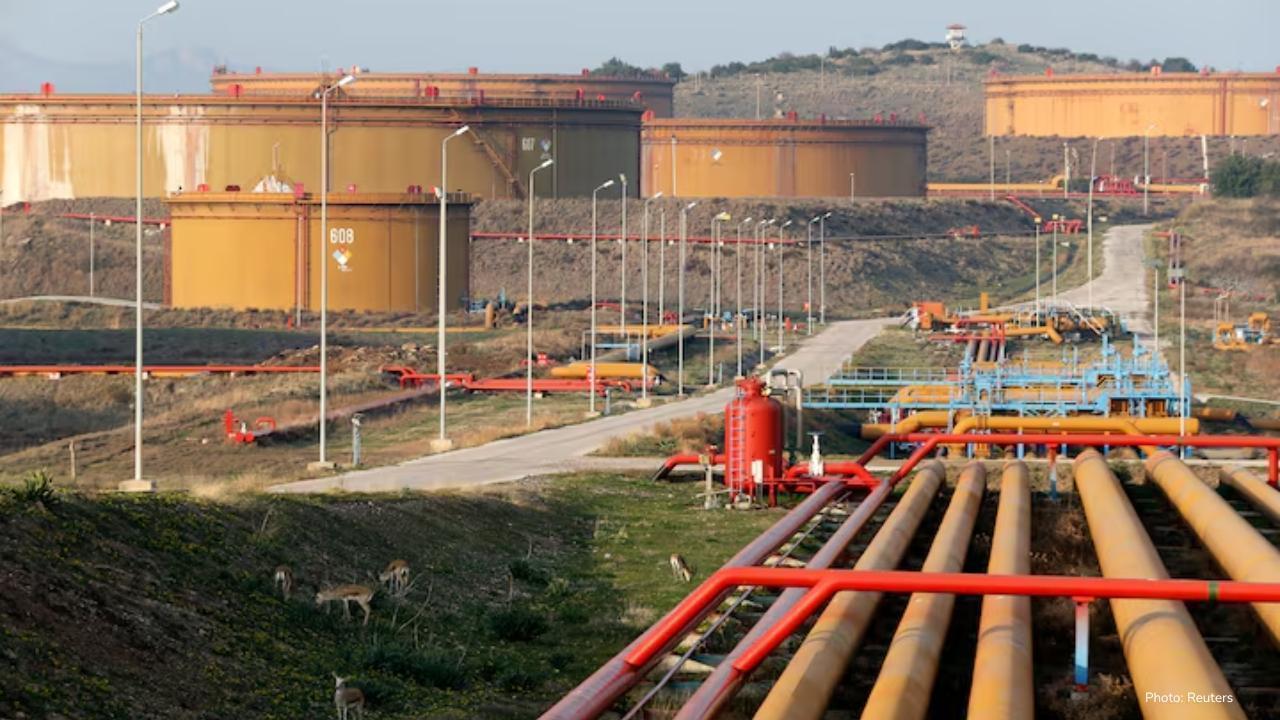
Post by : Monika
On September 27, 2025, Iraq resumed oil exports from its semi-autonomous Kurdistan region to Turkey after a suspension that lasted over two and a half years. This move is seen as a significant step toward stabilizing Iraq’s oil industry, strengthening regional economic ties, and addressing long-standing disputes between the Kurdistan Regional Government (KRG) and Iraq’s federal government.
The Kirkuk-Ceyhan pipeline, which carries oil from northern Iraq to the Mediterranean port in Turkey, had been inactive since March 2023. The suspension followed a ruling by the International Chamber of Commerce requiring Turkey to pay Iraq $1.5 billion for oil that was exported by the Kurdish authorities without federal approval between 2014 and 2018. This ruling caused tensions between Baghdad, Erbil, and international oil companies, eventually leading to the halt of oil flows from the region.
Background of the Oil Dispute
The Kurdistan region of Iraq is rich in oil and plays a key role in the country’s economy. However, disputes over control and revenue sharing between the KRG and Iraq’s federal government have created tensions for years. Between 2014 and 2018, the KRG exported oil through Turkey independently, bypassing Baghdad. While this provided the KRG with much-needed revenue, it created legal and financial disputes with Iraq’s federal government, as well as with international oil companies operating in the region.
The International Chamber of Commerce ruled in favor of Iraq, stating that Turkey owed compensation for the unauthorized exports. This decision directly led to the suspension of oil exports from Kurdistan, halting revenue for both the regional government and Iraq’s federal government. The stoppage affected oil markets internationally, causing concerns about regional energy stability.
Details of the Resumption
The resumption of oil exports began at 6 a.m. local time on September 27, 2025. According to Iraq’s oil ministry, the process started smoothly, with no significant technical problems. Initially, 180,000 to 190,000 barrels of oil per day will flow through the pipeline, with the goal to increase production to 230,000 barrels per day in the near future.
An independent trader will manage the sales from Turkey’s Ceyhan port, using Iraq’s state oil marketer SOMO’s official pricing. For every barrel sold, $16 will be placed into an escrow account, which will ensure fair distribution among producers. The agreement also stipulates that the KRG will supply at least 230,000 barrels per day to SOMO while keeping 50,000 barrels per day for local consumption in Kurdistan.
This arrangement is designed to satisfy both the Kurdish region’s economic needs and Iraq’s federal government’s demand for control over oil revenues. It also aims to provide stability for international markets that rely on Iraqi crude.
Economic Implications
The resumption of oil exports is expected to provide a much-needed economic boost for the KRG, which has struggled to fund public services during the pipeline’s shutdown. Schools, hospitals, and infrastructure projects had faced delays due to lack of revenue. By reopening the pipeline, the KRG can resume essential projects and improve local living standards.
The agreement also benefits Iraq’s federal government, which will receive revenue from Kurdish oil exports through the escrow mechanism. This ensures that Iraq as a whole can manage its national budget more effectively and meet obligations to international creditors and oil companies.
The deal also helps international oil companies operating in the Kurdistan region. Some of these companies had stopped exporting oil due to unpaid debts and uncertainty over revenue distribution. By establishing a clear payment mechanism, the resumption of exports could encourage these companies to increase production and investment in the region.
Challenges and Concerns
Despite the positive developments, several challenges remain. Some international oil companies, such as Norway’s DNO, have expressed hesitation about using the reopened pipeline immediately. DNO will continue to sell oil directly to the KRG on a monthly cash-and-carry basis, pricing it around $30 per barrel.
DNO and other companies are concerned about outstanding debts owed by the KRG. The KRG reportedly owes around $1 billion to oil producers, including $300 million to DNO alone. Until a formal payment plan is in place, some companies may continue to rely on direct sales instead of the pipeline, which could limit the volume of exports in the short term.
The success of the agreement also depends on continued cooperation between the KRG and Iraq’s federal government. Historical disputes over control of oil revenues have caused tensions in the past, and any disagreements could affect the pipeline’s operation.
Regional Implications
Resuming oil exports from Kurdistan has broader implications for the Middle East. Iraq is one of the region’s largest oil producers, and stability in its oil supply is important for global energy markets. The reopening of the Kirkuk-Ceyhan pipeline reassures buyers in Europe, Asia, and the Middle East that Iraqi oil will continue to reach international markets reliably.
The agreement also strengthens Iraq-Turkey relations. Turkey has been a key transit country for Kurdish oil, and the pipeline’s reopening will boost trade and economic ties between the two nations. This cooperation could pave the way for additional regional economic agreements in the future.
Humanitarian and Social Effects
In addition to economic benefits, the resumption of oil exports has a humanitarian dimension. The KRG had faced budget shortfalls during the two-and-a-half-year halt, affecting public services such as education, healthcare, and infrastructure. Reopening the pipeline provides the KRG with resources to support its population and improve living standards.
The escrow account mechanism also ensures transparency in revenue distribution, reducing the risk of corruption and mismanagement. This could help strengthen governance in the Kurdish region and improve trust between local authorities and citizens.
Future Outlook
A follow-up meeting is planned within 30 days to establish a formal payment mechanism for outstanding debts. The continued success of the pipeline will depend on the cooperation of the KRG, Iraq’s federal government, and international oil companies.
If the agreement works as intended, Kurdistan could see a gradual increase in oil exports, which would benefit both regional and federal governments. This stability could also encourage further investment in Iraq’s oil sector and promote economic development in the Kurdish region.
Experts believe that Iraq’s ability to maintain pipeline operations and resolve payment disputes will be crucial for the country’s long-term economic stability. International markets will also monitor the situation closely, as disruptions could affect global oil prices.
Historical Context
The Kirkuk-Ceyhan pipeline has a long history of political and economic significance. It was built to transport oil from northern Iraq to the Mediterranean, providing the KRG with a direct link to international buyers. Over the years, disputes between the KRG and Baghdad over control and revenue sharing have caused repeated shutdowns and political tension.
The 2014–2018 period, during which the KRG exported oil independently, created the conditions for the current legal and financial disputes. The International Chamber of Commerce ruling in favor of Iraq confirmed the need for formal agreements and proper revenue distribution between the KRG, Iraq’s federal government, and Turkey.
The resumption of Kurdish oil exports to Turkey marks a significant milestone for Iraq’s energy sector and regional economic stability. It provides immediate economic relief to the Kurdistan region, helps Iraq’s federal government secure revenues, and reassures international markets about the reliability of Iraqi oil supplies.
While challenges remain, including outstanding debts and cautious international companies, the agreement sets a positive precedent for cooperation between the KRG, Baghdad, and Turkey. The establishment of escrow accounts and formal payment mechanisms shows a commitment to transparency and long-term stability.
If the arrangement continues smoothly, Iraq could increase oil exports in the coming months, boost public services in Kurdistan, and strengthen regional economic ties. The situation will be closely watched by global markets and international oil companies, as successful implementation could pave the way for further cooperation in Iraq’s energy sector.
The resumption of Kurdish oil exports is not just a financial or logistical matter—it represents a step toward regional stability, economic recovery, and improved governance in northern Iraq. For the people of Kurdistan, it is a chance to see public services restored and for Iraq as a whole, it is an opportunity to demonstrate unity and resolve long-standing disputes.
Iraq oil exports Kurdistan oil










Sinner & Swiatek Shine at China Open: Semifinal Spots Secured
Jannik Sinner and Iga Swiatek advance to the semifinals at the China Open. Read about their victori

Michigan church attack kills 4, injures 8 in shocking violence
A gunman drove into a Michigan church, fired shots, set fire, killing 4 and injuring 8 before police

Moldova’s Pro-EU Party Secures Majority in Key Vote
Moldova’s pro-European PAS wins a strong majority in the parliamentary election, weakening pro-Russi

Gabriel’s late header gives Arsenal 2-1 win at Newcastle
Arsenal snatch dramatic 2-1 win at Newcastle as Gabriel heads the winner in stoppage time; Merino eq

Air France Flight 447 Trial Opens 16 Years After Tragic Crash
Sixteen years after the Air France Flight 447 crash, a trial opens against Air France and Airbus. Le

Europe close to Ryder Cup win after strong weekend play
Team Europe is on the verge of winning the Ryder Cup, showing great form in Italy and needing only a